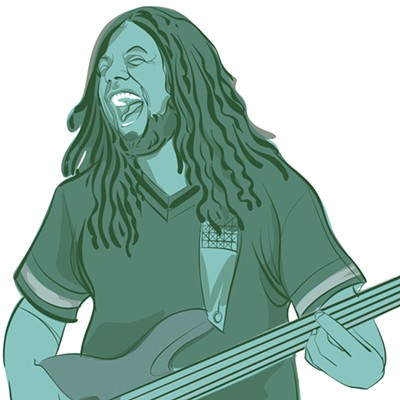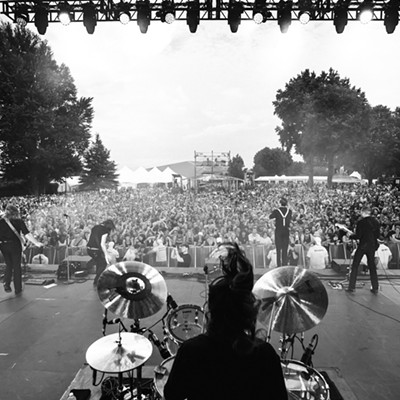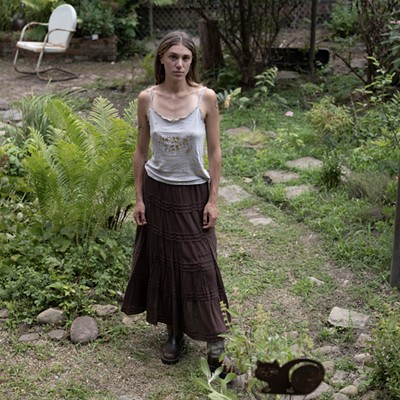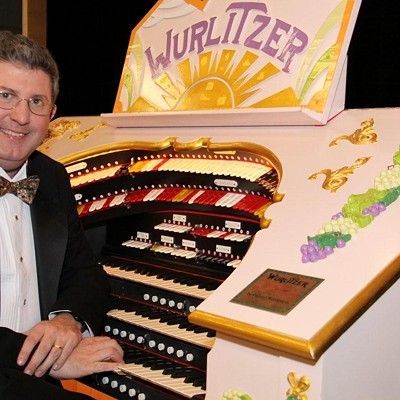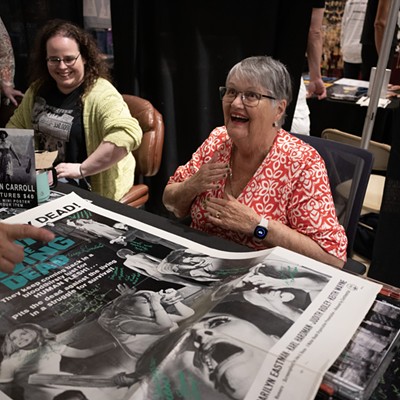Calliope: The Pittsburgh Folk Music Society celebrates four decades of advocating roots-based music
Its mission has satellites around the city, with a venue on the PCA’s lower floor, music classes taught at a nearby college, and concerts produced in collaboration with other arts organizations
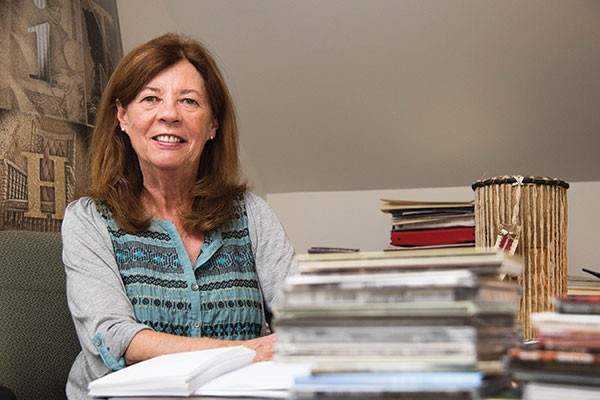
Calliope's executive director Patricia Tanner in her office
CALLIOPE CONCERTS WITH JOHN HAMMOND
7:30 p.m. Sat., Sept. 24. Carnegie Lecture Hall, 4400 Forbes Ave., Oakland. $20-45. 412-361-1915 or calliopehouse.org
[
{
"name": "Local Action Unit",
"component": "24929589",
"insertPoint": "3",
"requiredCountToDisplay": "1"
}
]
Back in 1976, a gentleman named George Balderose bought a house on the North Side which doubled as a place for folk musicians to congregate, sharing ideas and songs. In light of that year’s Bicentennial and the enduring popularity of people like Pete Seeger, folk music was alive and well. Known as the Calliope House, the building welcomed not only local folk musicians but national and, eventually, international ones.
A good 40 years later, the term “folk music” — like many musical descriptors — has taken on a greater dimension, while staying true to its homespun roots. Likewise, Calliope House has come a long way. Now known as Calliope: The Pittsburgh Folk Music Society, the organization consists of three full-time and one part-time staff members, plus board members. It operates out of the Pittsburgh Center for the Arts, in Shadyside. But its mission has satellites around the city, with a venue on the PCA’s lower floor, music classes taught at a nearby college, and concerts produced in collaboration with other arts organizations.
Patricia Tanner, Calliope’s executive director, has been with the organization since 1999. Talking in her office, it becomes clear that, while music and Calliope have both evolved, the vision has remained largely the same. It focuses on artists who have become institutions in folk and traditional music, while supporting newer acts that have a reverence for their predecessors. “In the ’60s, you had the folk revival, and 40 years ago when the organization was founded, everybody was familiar with the word ‘folk,’ because it really related to that [music],” she says. “But over the years, it has evolved so much. I’m thrilled that young groups now that we definitely consider part of [the music] we’re trying to present and preserve — like the Avett Brothers, the Lumineers, and Mumford and Sons — are very much [like] the young artists that we’re presenting, and who we hope that someday will get to that level.”
There were some speed bumps along the way, including a period when Calliope seemed close to shuttering its doors. But Calliope has been able to adapt during the tougher times. “We’ve always operated on a shoestring budget, so we constantly reassess our budget and cut back whenever we need to,” Tanner says. “We’ve seen a lot of growth over the past 15 or so years. Back in ’99, it was really just starting up again as an all-volunteer organization when I came on board. I think they tried to grow too quickly. And [we] just had to stop and reassess. So we’ve been growing but in a much slower way.”
The slow growth has paid off and helped organizers realize what works and what needs to be revisited. For example, benefit concerts, which have featured legends like Arlo Guthrie, Odetta and Richie Havens, seemed like a sure-fire way to help Calliope grow. It only took one concert to set them back, Tanner says, recalling a performance with Grateful Dead drummer Mickey Hart in 2002. “We had it on the books for months and months and months,” Tanner says. “Then, all of a sudden, it was announced that the Farm Aid concert was coming to Pittsburgh on the same night. With Willie Nelson and Neil Young. That really hurt our ticket sales. So we really pulled back after that.”
This year, the Calliope Concerts feature eight performances in the season, which begins this week and lasts through May. Held at the Carnegie Lecture Hall in Oakland, behind the library, it kicks off on Saturday with acoustic blues artist John Hammond, whom Tom Waits once compared to “a big train coming. He chops them all down.” Along with an appearance next spring by Loudon Wainwright III, Tom Rush offers another high point of the series. A driving force in the folk revival of the ’60s, with a career that continued in the ensuing years, Rush has announced that this will be his final tour.
In addition to these concerts, there will be two fundraisers — with blues legend Taj Mahal (Oct. 9) and Rita Coolidge (March 18). VIP ticket-holders can also attend a post-concert reception with both acts at The Porch, in Schenley Plaza.
But Calliope also continues to be active with local musicians in a number of ways. When the organization moved into the PCA in 2005, it set up the Roots Cellar there, as a venue for local musicians with seating for up to 175 people. “We always dreamed of having what we called ‘Calliope’s Front Porch,’ to have musicians sit on the front porch and jam. Inside, we’d roll away the rugs and have concerts,” Tanner says. “Not long after settling in up here, we started talking about the possibility of us renovating their dance studio in the basement. [Now] it’s all acoustically sound. We mainly program [performances] on Thursday nights.”
Among its regular events, the Roots Cellar hosts the annual CD-release show for the Pittsburgh Songwriters Circle, a group that came out of a weekly open-stage night. It isn’t always adult songwriters who participated in the Circle either. The 2013 compilation CD featured Sarah Plowman, a then-12-year-old girl from Cranberry who was just learning about performing and writing songs.
Calliope maintains its mission to nurture musicians by continuing to offer classes and lessons. At Chatham University, Calliope offers 10 to 12 classes in an eight-week semester, but the structure is being adapted to engage more students. “We’re finding a lot of people are more interested in committing less time to taking a class,” says Lisa Alexander, Calliope’s marketing director. “We’re still going to have our traditional eight-week courses, but we’re adding some workshops. The one that we’re pretty excited about is songwriting with Greg Joseph from The Clarks. We haven’t had a songwriting course in a few years now.”
Calliope has often hosted songwriting workshops with performers like Patty Larkin, if touring schedules allow it. More than just another meet-and-greet, it offers an opportunity to gain insight into the writing process. The workshops are most beneficial to “[local] songwriters who are very, very interested in the subject matter,” Tanner says. “I’ve attended some of these workshops. The questions and the interaction are really educational for me. The local artists tend get a lot out of it.”
After four decades, it seems inevitable that Calliope is known across the country. Members of the organization helped to develop Kansas City’s Folk Alliance International Conference, a 29-year-old annual event that draws 2,000 performers and industry people from 17 countries.
While Tanner mentions her group’s affiliation with that event, she seems equally proud, if not more, of things Calliope has developed back home. “When I started working with Calliope, I was meeting people that were in bands,” she says. “They told me they met in the Calliope School, where they started jamming, and practicing. Next thing you know, they’re off doing their own band. I always thought that was great. You don’t get that with private lessons.”
For an entire schedule of concerts and classes, go to calliopehouse.org.
A good 40 years later, the term “folk music” — like many musical descriptors — has taken on a greater dimension, while staying true to its homespun roots. Likewise, Calliope House has come a long way. Now known as Calliope: The Pittsburgh Folk Music Society, the organization consists of three full-time and one part-time staff members, plus board members. It operates out of the Pittsburgh Center for the Arts, in Shadyside. But its mission has satellites around the city, with a venue on the PCA’s lower floor, music classes taught at a nearby college, and concerts produced in collaboration with other arts organizations.
Patricia Tanner, Calliope’s executive director, has been with the organization since 1999. Talking in her office, it becomes clear that, while music and Calliope have both evolved, the vision has remained largely the same. It focuses on artists who have become institutions in folk and traditional music, while supporting newer acts that have a reverence for their predecessors. “In the ’60s, you had the folk revival, and 40 years ago when the organization was founded, everybody was familiar with the word ‘folk,’ because it really related to that [music],” she says. “But over the years, it has evolved so much. I’m thrilled that young groups now that we definitely consider part of [the music] we’re trying to present and preserve — like the Avett Brothers, the Lumineers, and Mumford and Sons — are very much [like] the young artists that we’re presenting, and who we hope that someday will get to that level.”
There were some speed bumps along the way, including a period when Calliope seemed close to shuttering its doors. But Calliope has been able to adapt during the tougher times. “We’ve always operated on a shoestring budget, so we constantly reassess our budget and cut back whenever we need to,” Tanner says. “We’ve seen a lot of growth over the past 15 or so years. Back in ’99, it was really just starting up again as an all-volunteer organization when I came on board. I think they tried to grow too quickly. And [we] just had to stop and reassess. So we’ve been growing but in a much slower way.”
The slow growth has paid off and helped organizers realize what works and what needs to be revisited. For example, benefit concerts, which have featured legends like Arlo Guthrie, Odetta and Richie Havens, seemed like a sure-fire way to help Calliope grow. It only took one concert to set them back, Tanner says, recalling a performance with Grateful Dead drummer Mickey Hart in 2002. “We had it on the books for months and months and months,” Tanner says. “Then, all of a sudden, it was announced that the Farm Aid concert was coming to Pittsburgh on the same night. With Willie Nelson and Neil Young. That really hurt our ticket sales. So we really pulled back after that.”
This year, the Calliope Concerts feature eight performances in the season, which begins this week and lasts through May. Held at the Carnegie Lecture Hall in Oakland, behind the library, it kicks off on Saturday with acoustic blues artist John Hammond, whom Tom Waits once compared to “a big train coming. He chops them all down.” Along with an appearance next spring by Loudon Wainwright III, Tom Rush offers another high point of the series. A driving force in the folk revival of the ’60s, with a career that continued in the ensuing years, Rush has announced that this will be his final tour.
In addition to these concerts, there will be two fundraisers — with blues legend Taj Mahal (Oct. 9) and Rita Coolidge (March 18). VIP ticket-holders can also attend a post-concert reception with both acts at The Porch, in Schenley Plaza.
But Calliope also continues to be active with local musicians in a number of ways. When the organization moved into the PCA in 2005, it set up the Roots Cellar there, as a venue for local musicians with seating for up to 175 people. “We always dreamed of having what we called ‘Calliope’s Front Porch,’ to have musicians sit on the front porch and jam. Inside, we’d roll away the rugs and have concerts,” Tanner says. “Not long after settling in up here, we started talking about the possibility of us renovating their dance studio in the basement. [Now] it’s all acoustically sound. We mainly program [performances] on Thursday nights.”
Among its regular events, the Roots Cellar hosts the annual CD-release show for the Pittsburgh Songwriters Circle, a group that came out of a weekly open-stage night. It isn’t always adult songwriters who participated in the Circle either. The 2013 compilation CD featured Sarah Plowman, a then-12-year-old girl from Cranberry who was just learning about performing and writing songs.
Calliope maintains its mission to nurture musicians by continuing to offer classes and lessons. At Chatham University, Calliope offers 10 to 12 classes in an eight-week semester, but the structure is being adapted to engage more students. “We’re finding a lot of people are more interested in committing less time to taking a class,” says Lisa Alexander, Calliope’s marketing director. “We’re still going to have our traditional eight-week courses, but we’re adding some workshops. The one that we’re pretty excited about is songwriting with Greg Joseph from The Clarks. We haven’t had a songwriting course in a few years now.”
Calliope has often hosted songwriting workshops with performers like Patty Larkin, if touring schedules allow it. More than just another meet-and-greet, it offers an opportunity to gain insight into the writing process. The workshops are most beneficial to “[local] songwriters who are very, very interested in the subject matter,” Tanner says. “I’ve attended some of these workshops. The questions and the interaction are really educational for me. The local artists tend get a lot out of it.”
After four decades, it seems inevitable that Calliope is known across the country. Members of the organization helped to develop Kansas City’s Folk Alliance International Conference, a 29-year-old annual event that draws 2,000 performers and industry people from 17 countries.
While Tanner mentions her group’s affiliation with that event, she seems equally proud, if not more, of things Calliope has developed back home. “When I started working with Calliope, I was meeting people that were in bands,” she says. “They told me they met in the Calliope School, where they started jamming, and practicing. Next thing you know, they’re off doing their own band. I always thought that was great. You don’t get that with private lessons.”
For an entire schedule of concerts and classes, go to calliopehouse.org.



